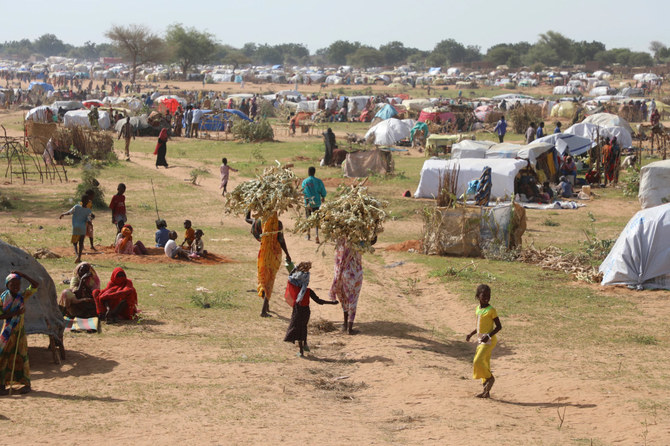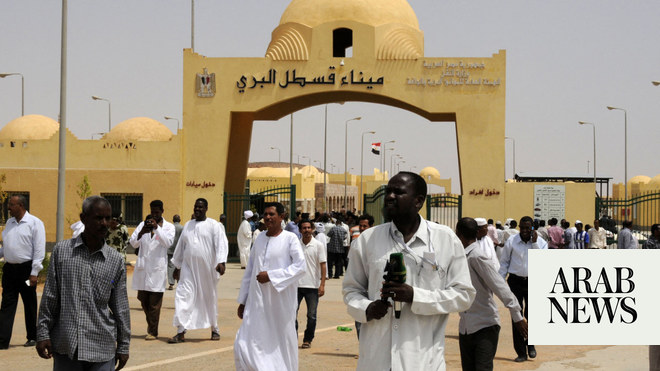
The war that erupted in Sudan in April between the Sudanese Armed Forces and the Rapid Support Forces continues to rage with no resolution in sight.
This kind of protracted conflict often has long-term consequences, which can be catastrophic and cause an existential crisis not only for the country affected but also for other countries in the region. This is why it is critical for media outlets, scholars, politicians and policy analysts to raise awareness about the severity of the issue.
The armed conflict has caused more than 5 million people from all of Sudan’s 18 states to become displaced as they try to flee the violence. According to the latest statistics, more than 4 million people are internally displaced, while more than 1 million have fled the country. The highest concentrations of people leaving their homes are from the following states: River Nile (15 percent), Northern (11 percent), North Darfur (9 percent) and White Nile (9 percent).
But it is also important to point out that, before the current conflict began, Sudan was among the world’s top 10 countries in terms of hosting refugees. These people were from countries including Ethiopia, Syria and Eritrea. As a result, not only is the armed conflict forcing Sudanese to leave their homes, but it will most likely also force asylum seekers and refugees from other countries to leave as well. This will make the refugee crisis in the region much more severe.
One of the countries to have received a large number of Sudanese refugees is Chad. Other refugee-receiving countries include South Sudan, Egypt, Ethiopia, the Central African Republic and Libya. Those who make it to one of Sudan’s neighboring countries go through a harrowing and difficult journey. World Food Programme Chad Country Director Pierre Honnorat in July described the situation while speaking to journalists via Zoom from the Zabout refugee camp in Goz Beida. He said: “We can see that they have suffered, many lost family members, and we don’t even dare ask them, ‘Where are the men?’ The answer from the mothers is often that they were killed. So, you just see many women, many children.”
In such a large-scale displacement and refugee crisis, women, children and the wounded are among the most vulnerable groups. They need medical attention and basic needs such as food, water and shelter. According to the UN High Commissioner for Refugees, almost 90 percent of the Sudanese arriving in Chad are women and children. And an analysis from August by the Integrated Food Security Phase Classification showed that more than 6 million Sudanese are currently one step away from famine.
This means that if the funding to provide basic necessities is not provided by the international community, there could be a humanitarian disaster potentially impacting societies and countries for generations to come.
The countries that Sudanese refugees are fleeing to are struggling with their own socioeconomic crises.
Dr. Majid Rafizadeh
Global assistance in the areas of food, nutrition, primary healthcare, mental health and child health services are critical to prevent deaths, suffering and more cases of infectious diseases and other illnesses. “Every week, children are dying at the nutrition centers; this is a reality. The malnutrition rate for children now is just too high and we need to be extremely quick in prevention to make sure that those who are under what we call moderate to acute malnutrition can urgently get what they need so they don’t fall into severe malnutrition,” Honnorat said.
In other words, for Sudanese refugees, fleeing the conflict and making it to a neighboring country does not mean that their problems are over.
The countries that Sudanese refugees are fleeing to are struggling with their own socioeconomic crises. For example, although Chad is welcoming Sudanese refugees, many of whom come from Darfur, it has its own multifaceted crisis and financial woes. Chad is one of the poorest countries in the world and it was already hosting more than half a million refugees from Sudan before the conflict erupted in April.
Most of the Sudanese refugees in Chad are living in refugee camps and host communities. The level of underdevelopment in the country is alarming, which makes the situation much worse. As the US Agency for International Development has pointed out: “Only about 6 percent of the population has access to electricity and only 8 percent has access to basic sanitation. Adult literacy is 22 percent. Life expectancy is only 53 years. Around three-quarters of all births take place without the attendance of a skilled health professional.”
Countries such as Chad and Egypt will likely face more political and economic strain if they are not prepared for this crisis due to the fact that refugees can have a significant impact not only on the economy of the host nation, but also on its social, political and even environmental landscapes.
This is why it is critical that the UN, in cooperation with the African Union, assists the Sudanese refugees when it comes to providing nutrition, primary healthcare, mental health and child health services. Helping the host countries that lack the resources to deal with the influx of refugees is also paramount.
In summary, it is incumbent on the international community to make it a priority to help the Sudanese refugees and their host nations.
• Dr. Majid Rafizadeh is a Harvard-educated Iranian-American political scientist.
X: @Dr_Rafizadeh











